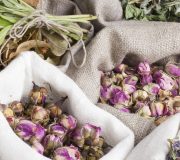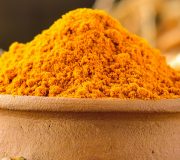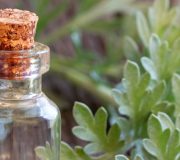About this Episode
In this episode of the Medicinal Herbs podcast from WholisticMatters, guest Marisa Marciano, ND, RH, returns to talk with host Daina Parent, ND, about the common clinical conditions and concerns she sees in her practice and the medicinal role played by herbs. Some of the most common issues Marisa addresses with her patients involve stress, hormones, and digestion. Additionally, Marisa and Daina talk about their favorite herbal home remedies for culinary and first-aid applications.
How Are Herbs Used in Clinical Practice?
The very first thing that comes to Marisa’s mind when she ponders the most common conditions she addresses in her practice: stress. Even when a patient doesn’t specifically complain about stress, it’s usually at least a piece of what is going on, Marisa says (01:38). Stress manifests differently for everyone, but some related clinical concerns may include:
- Sleep issues
- Anxiety
- Low mood
People assume nothing can really be done about stress; many people Marisa sees in her clinic have tried different things without success. Often people dealing with stress are described as “tired and wired,” though stress can impact the body system-wide, including the cardiovascular, immune, and digestive systems.
Specific Herbs for Stress (05:12)
- Chamomile: A nervine relaxant commonly known to be a bedtime tea, but it doesn’t necessarily make you sleepy
- Holy basil: A nervine tonic
- Skullcap: A nervine tonic with a long traditional use for stress and tension, especially in the jaw, shoulder, and neck
In addition to these nervine herbs, Marisa likes adaptogens like Ashwagandha for stress, especially when combined with insomnia. Ashwagandha may help regulate cortisol levels. Additionally, valerian may be helpful for stress, and dosing is particularly important for this herb as it impacts how it will act in the body.
>> Learn more about the herbal terms “nervine,” “tonic,” and “adaptogen” (09:50)
Herbs for Hormonal Concerns
For the variety of hormonal concerns that she addresses in her practice (PMS, menopause, menstrual cramping), Marisa uses adaptogenic herbs, especially those with phytoestrogens, which modulate estrogen activity and the affinity of endogenous estrogen receptors (13:53). An important herb for hormonal concerns is chaste tree, which acts on the pituitary gland. Regarding hormone health, liver support is important as well (18:13). For liver support, Marisa likes milk thistle and schisandra.
Herbs for Digestive Issues
Regarding digestive complaints, Marisa emphasizes the importance of first addressing the diet and even considering stress as the underlying issue (21:53). Herbs commonly used to address digestive problems act quickly. Marisa recommends utilizing bitter herbs before eating and carminative herbs after eating. Bitter herbs have volatile oils and aromatic properties that work to relax smooth muscle within the digestive tract. Herbs commonly used for digestive issues include:
Herbal Home Remedies
The best herbs for home remedies are those with a very long history of safe use, to be used for mild, everyday complaints (27:38).
Culinary Applications of Herbal Medicine
For herbs and medicinal plants used in the kitchen, Marisa enjoys carminatives for their pleasant taste and aroma, including:
- Ginger, garlic, and onion
- Fennel seeds
- Mushrooms: cordyceps, lion’s mane, reishi, shitake, cremini
- Elderberry
“Your kitchen cabinet can be a medicine cabinet,” Marisa says. Her favorite spices include cinnamon and cumin (34:25). A few tips for your culinary medicine cabinet:
- Use more than a tiny sprinkle; add extra herbs
- Keep your herbs and spices fresh
- Invest in a mortar and pestle for ultimate botanical freshness
Herbs Used in First-aid
Marisa utilizes calendula, an herb known as a wound healer, which can be infused into oils, salves, and ointments (32:51).
Disclaimer
In this podcast, Marisa reminds our listeners that herbalists should work within their scope, and non-herbalists should work with a qualified healthcare practitioner. It is important to be aware of the potential for adverse reactions. Monitor appropriately, treat the root cause, and treat only in cases of mild-to-moderate severity. Lastly, medicinal herbs in clinical practice need to be used alongside appropriate diet and lifestyle changes for best results.

















